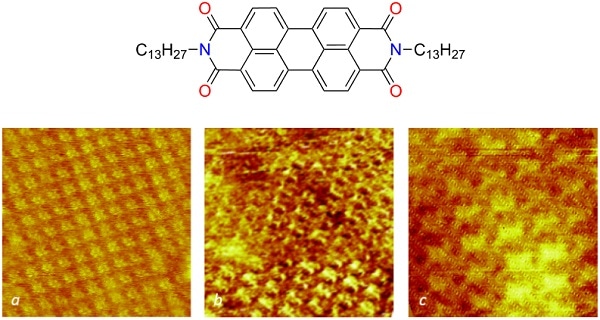Aug 10 2016
Dyes have long been used as colorants, stains, and markers. Their potential use as optical materials has been widely investigated, especially in recent years in the context of dye-sensitized solar cells, where dyes play the role of sunlight absorber.
 Regular arrangements of dye molecules on graphene. Top: The particular dye molecule used in the study. Image reproduced from Beilstein Journal of Nanotechnology
Regular arrangements of dye molecules on graphene. Top: The particular dye molecule used in the study. Image reproduced from Beilstein Journal of Nanotechnology
In order to study and understand the optical properties of dye molecules, however, scientists need to assemble them in thin molecular layers. Thin films of dye molecules made with traditional methods, such as for example Langmuir-Blodgett assembly or spin coating, consist of molecules with random orientations, which can yield low optical signal and data that is difficult to interpret. Now, scientists at CNRS in France have used a graphene substrate to produce a monolayer of well-organized dye molecules and study its optical properties.
The paper “Optical absorption signature of a self-assembled dye monolayer on graphene”, published in the Beilstein Journal of Nanotechnology, applies a commercially available dye (N,N′-Ditridecylperylene-3,4,9,10-tetracarboxylic diimide (PTCDI-C13)) onto CVD graphene by drop casting or dip coating. Using optical spectroscopy and polarized transmission measurements, the scientists conclude that the elongated molecules assemble all with their long axes pointing in the same direction, leading to a strong response to optical probing. Features observed in transmission measurements are sharper than on a similar layer that was produced without graphene. Furthermore, using scanning tunneling microscopy (STM), they find that the molecules are arranged in a regular periodic lattice.
The researchers attribute the regularity of the arrangement to electrostatic interactions between the dye molecules and graphene.